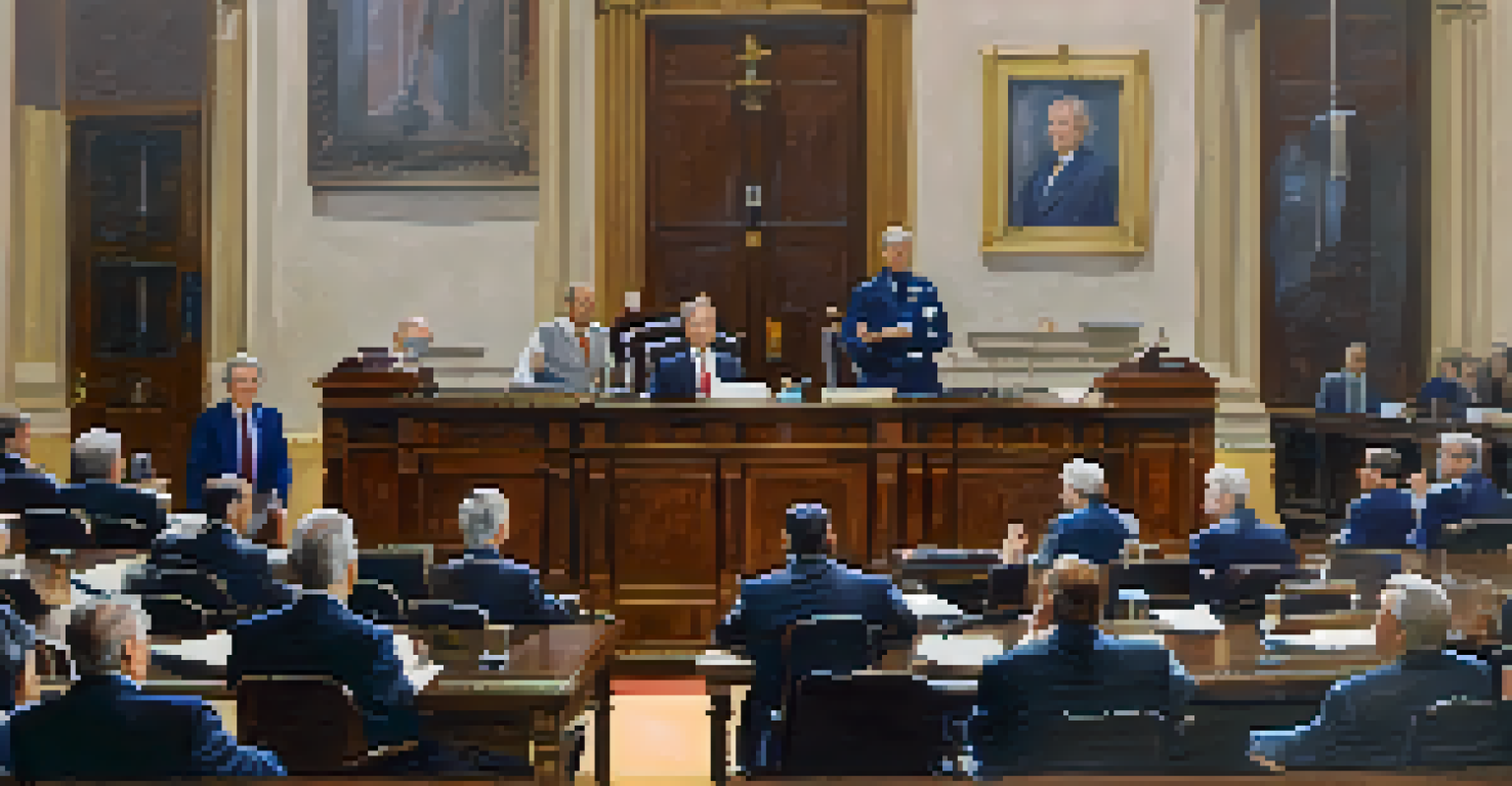The Role of the Tennessee General Assembly in Governance

Introduction to the Tennessee General Assembly
The Tennessee General Assembly is the legislative branch of the state government, responsible for making laws that govern the state. Comprised of two chambers, the House of Representatives and the Senate, it plays a crucial role in shaping state policies. Each year, elected representatives gather to discuss, debate, and decide on a wide range of issues that impact the lives of Tennesseans.
The greatest danger in times of turbulence is not the turbulence; it is to act with yesterday's logic.
Understanding the Assembly's function is essential for grasping how state governance works. It serves not only as a lawmaking body but also as a platform for public discourse and participation. Citizens have the opportunity to engage with their representatives, making the Assembly an essential link between the government and the people.
From budget allocations to education reform, the General Assembly’s decisions resonate throughout the entire state. This article will delve into the key roles and responsibilities of the Tennessee General Assembly, shedding light on its significance in the governance process.
The Legislative Process in Tennessee
The legislative process in Tennessee is a structured yet dynamic system that enables the creation of laws. It starts with the introduction of a bill, proposed by a member of either chamber, which then undergoes a series of reviews and votes. This process is crucial as it allows for thorough examination and discussion, ensuring that various perspectives are considered.

Committees play a significant role in this process, as they evaluate the bill's merit and impact before it reaches the floor for a vote. This step is vital in filtering out legislation that may not meet the needs of the state. Once a bill passes through both chambers, it is sent to the governor for approval, completing the legislative cycle.
Tennessee Assembly's Legislative Role
The Tennessee General Assembly is essential for creating laws and shaping state policies that affect the lives of its residents.
Ultimately, this intricate process ensures that laws are crafted with care, reflecting the interests and values of Tennesseans. The collaborative nature of the Assembly helps foster an environment where diverse voices contribute to the lawmaking journey.
Key Responsibilities of the General Assembly
One of the primary responsibilities of the Tennessee General Assembly is to create and amend laws. This includes everything from fiscal policies to social issues, impacting various aspects of life in Tennessee. It’s a weighty responsibility, as the laws passed can have lasting effects on communities and individuals across the state.
Democracy is not a spectator sport.
Additionally, the Assembly is tasked with overseeing the state budget, which dictates how funds are allocated to different departments and programs. This budgetary control is vital in ensuring that resources are effectively utilized to meet the needs of the population. By scrutinizing budget proposals, legislators help to maintain fiscal responsibility.
Moreover, the General Assembly acts as a check on the executive branch, holding the governor accountable for their actions. This balance of power is essential in maintaining a healthy democracy, allowing for transparency and public trust in government operations.
The Role of Committees in the Assembly
Committees are the backbone of the Tennessee General Assembly, allowing for detailed examination of proposed legislation. Each committee focuses on specific areas, such as education or health, enabling members to leverage their expertise and interests. This structure not only streamlines the legislative process but also enhances the quality of discussions.
Through public hearings and expert testimonies, committees gather valuable information that informs their recommendations. This ensures that laws are not only well-informed but also reflect the needs of constituents. It’s a collaborative effort that often leads to more comprehensive and effective legislation.
Importance of Citizen Engagement
Citizen involvement in the legislative process is crucial, allowing Tennesseans to influence decisions and advocate for their needs.
Ultimately, committees serve as a microcosm of the Assembly, showcasing the diversity of thought and opinion within the legislature. Their work is essential in shaping the laws that govern Tennessee, making them a critical component of the legislative process.
How Citizens Can Engage with the Assembly
Citizen engagement is a cornerstone of a healthy democracy, and the Tennessee General Assembly encourages public involvement in its processes. Residents can attend sessions, participate in public hearings, and communicate directly with their representatives. This open-door approach fosters a sense of community and shared responsibility in governance.
Moreover, citizens can advocate for issues they care about by reaching out to legislators or participating in grassroots campaigns. This advocacy plays a crucial role in ensuring that lawmakers understand the public's priorities and concerns. By being vocal about their needs, Tennesseans can influence the legislative agenda.
In addition to direct communication, citizens can also follow legislative developments through various channels, such as social media and official websites. Staying informed empowers individuals to participate meaningfully in the democratic process, reinforcing the idea that everyone has a stake in the governance of their state.
The Impact of the General Assembly on Tennessee's Future
The decisions made by the Tennessee General Assembly have far-reaching implications for the state's future. From education reform to infrastructure projects, the laws passed today shape the landscape of tomorrow. As Tennessee continues to grow and evolve, the Assembly's role in addressing emerging challenges becomes increasingly crucial.
Furthermore, the legislative priorities set by the Assembly can influence economic development, social equity, and public health initiatives. By focusing on comprehensive and forward-thinking policies, the General Assembly can help create a more equitable and prosperous state for all residents. This forward-looking approach is essential in navigating the complexities of modern governance.
Committees Drive Lawmaking Efficiency
Committees within the Assembly provide a structured way to examine legislation, ensuring informed discussions and effective lawmaking.
Ultimately, the General Assembly holds the power to drive change and innovation in Tennessee. Its decisions can either pave the way for progress or hinder growth, making it imperative that legislators remain responsive to the needs of their constituents.
Conclusion: The Significance of Legislative Engagement
In conclusion, the Tennessee General Assembly plays a vital role in the governance of the state, impacting every aspect of life for its residents. Understanding its functions, responsibilities, and the legislative process is essential for engaging with and influencing state governance. Citizens have the power to shape the future by participating in this crucial democratic process.
As the Assembly navigates challenges and opportunities, the importance of informed and engaged citizens cannot be overstated. By staying involved, advocating for issues, and communicating with representatives, Tennesseans can help ensure that their voices are heard and their needs are met.

The future of Tennessee depends on a collaborative relationship between the General Assembly and its citizens. Together, they can work towards a thriving state that reflects the values and aspirations of all its residents.